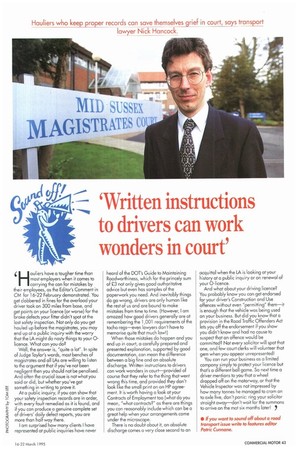'Written instructions to drivers can work wonders in court'
Page 45

If you've noticed an error in this article please click here to report it so we can fix it.
g auliers have a tougher time than most employers when it comes to
carrying the can for mistakes by their employees, as the Editor's Comment in CM for 16-22 February demonstrated. You get clobbered in fines for the overload your driver took on 300 miles from base, and get points on your licence (or worse) for the brake defects your fitter didn't spot at the last safety inspection. Not only do you get hauled up before the magistrates, you may end up at a public inquiry with the worry that the LA might do nasty things to your 0licence. What can you do?
Well, the answer is, "quite a lot". In spite of Judge Taylor's words, most benches of magistrates and all [As are willing to listen to the argument that if you've not been negligent then you should not be penalised. And often the crucial issue is not what you said or did, but whether you've got something in writing to prove it. At a public inquiry, if you can show that your safety inspection records are in order, with every fault remedied as it is found, and if you can produce a genuine complete set of drivers' daily defect reports, you are more than half way there. I am surprised how many clients I have represented at public inquiries have never heard of the DOT's Guide to Maintaining Roadworthiness, which for the princely sum of 23 not only gives good authoritative advice but even has samples of the paperwork you need. And inevitably things do go wrong, drivers are only human like the rest of us and are bound to make mistakes from time to time. (However, I am amazed how good drivers generally are at remembering the 1,001 requirements of the tacho regs—even lawyers don't have to memorise quite that much law!) When those mistakes do happen and you end up in court, a carefully prepared and presented explanation, supported by good documentation, can mean the difference between a big fine and an absolute discharge. Written instructions to drivers can work wonders in court—provided of course that they refer to the thing that went wrong this time, and provided they don't look like the small print on an HP agreement. It is worth having a look at your Contracts of Employment too (what do you mean, "what contracts?" as there are things you can reasonably include which can be a great help when your arrangements come under the microscope. There is no doubt about it, an absolute discharge comes a very close second to an acquittal when the LA is looking at your history at a public inquiry or on renewal of your 0-licence. And what about your driving licence? You probably know you can get endorsed For your driver's Construction and Use offences without even "permitting" them—it is enough that the vehicle was being used on your business. But didyou know that a provision in the Road Traffic Offenders Act lets you off the endorsement if you show you didn't know and had no cause to suspect that an offence would be committed? Not every solicitor will spot that one, and few court clerks will volunteer that gem when you appear unrepresented!
You can run your business as a limited company simply to protect your licence but that's a different ball game. So next time a driver mentions to you that a wheel dropped off on the motorway, or that the Vehicle Inspector was not impressed by how many tonnes he managed to cram on to axle five, don't panic: ring your solicitor straight away—don't wait for the summons to arrive on the mat six months later!
• If you want to sound off about a road transport issue write to features editor Patric Cunnane.




















































































































